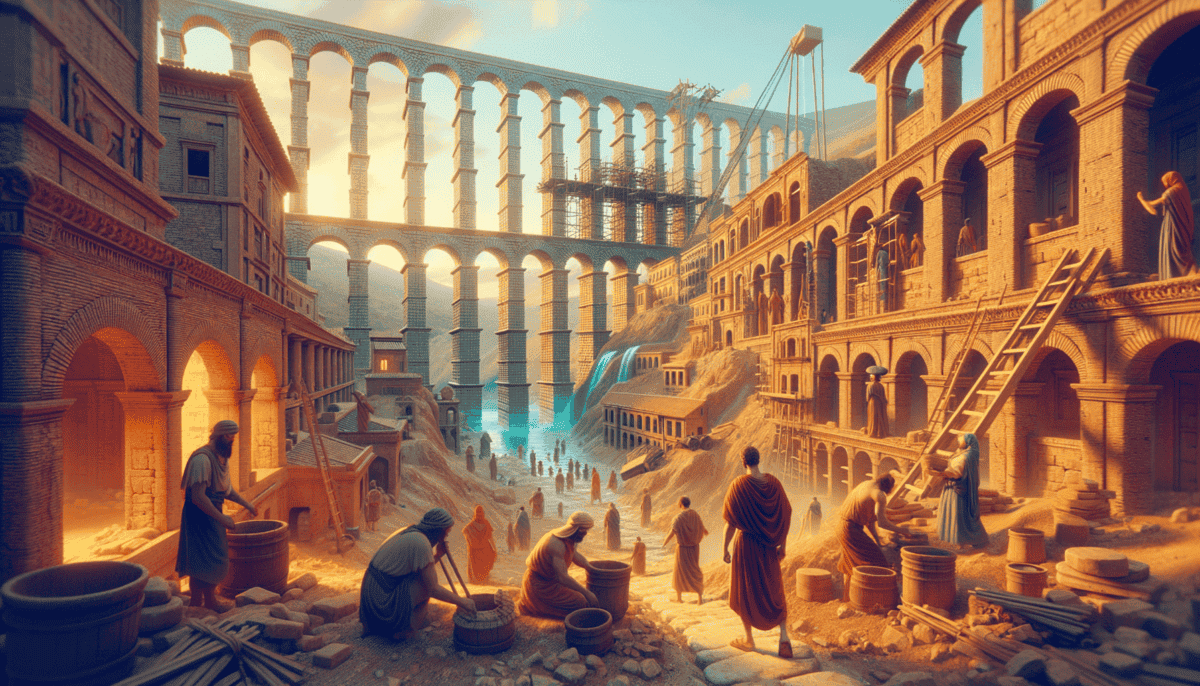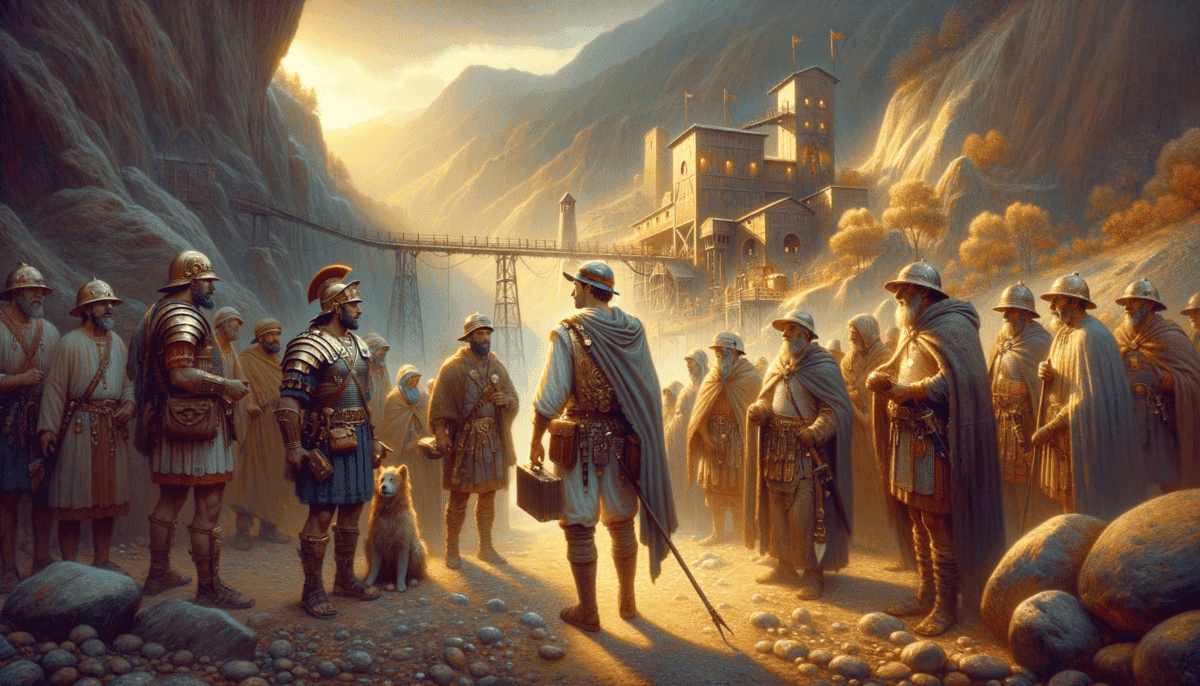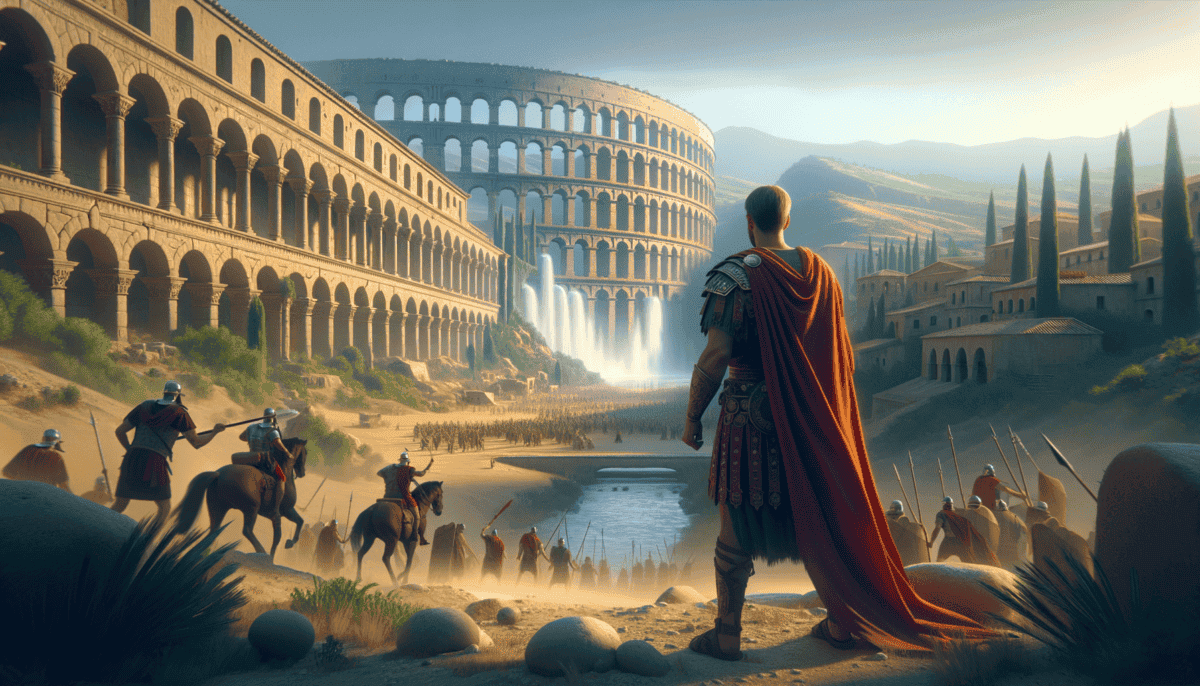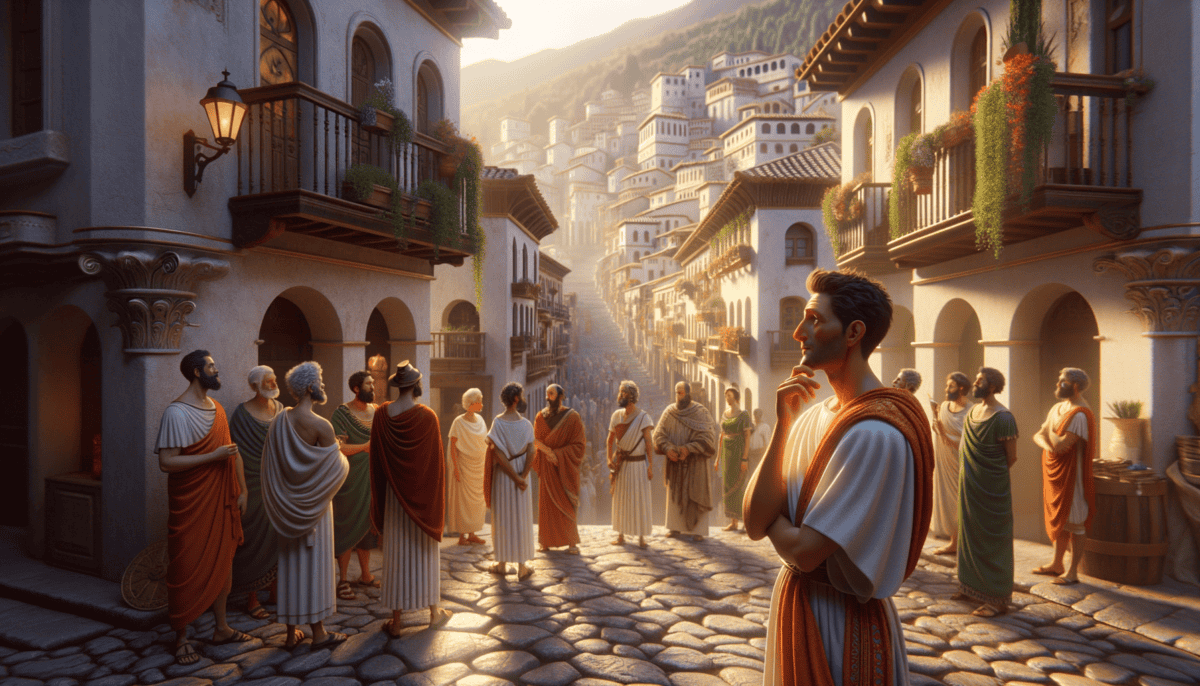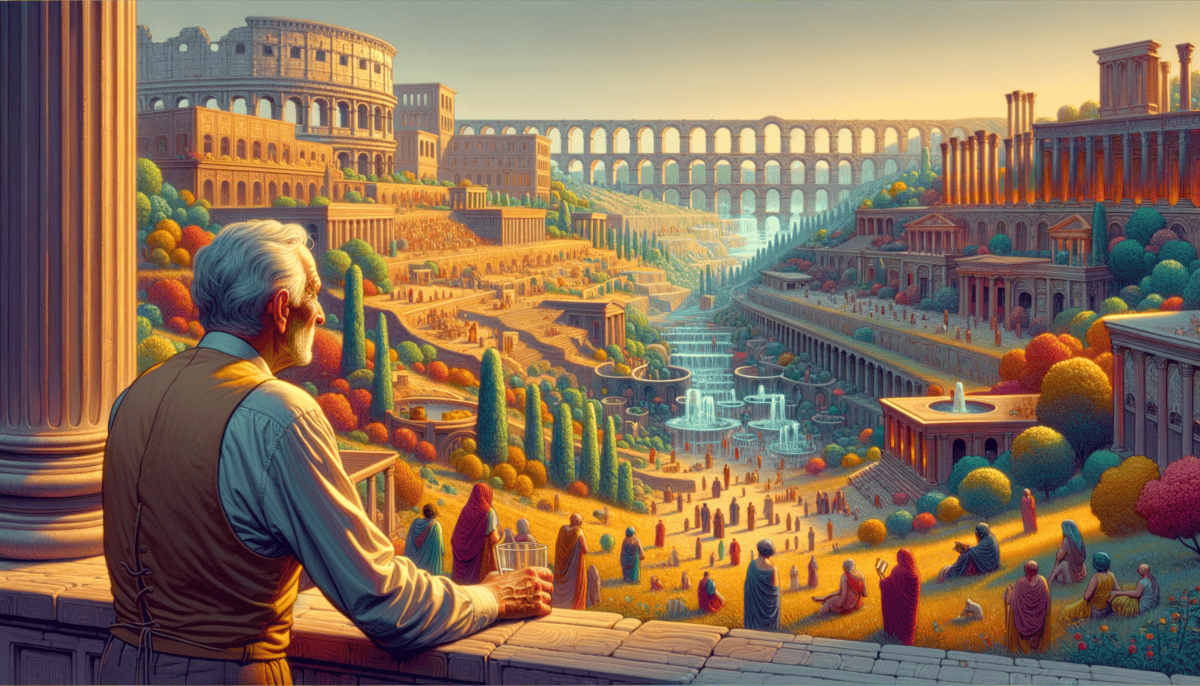A New Land at Dawn
The morning sun peeked over the hills of Hispania, painting the sky in beautiful orange and pink colors. Young Lucius stood at the ship's rail, his heart racing with excitement. At just ten years old, he was about to start a big adventure in this strange new land.
"Look, Lucius!" his father Marcus called out. "That's where we'll make our new home." Marcus pointed to the rocky shore ahead, where tall cliffs met the blue sea.
The ship rocked gently as it moved closer to land. Lucius could see other Roman ships nearby, their red sails bright against the morning sky. Soldiers in shiny armor stood ready on the decks, their eagles gleaming in the sunlight. ⚔️
“Is it very different from Rome, Father?” Lucius asked, squinting at the distant shore.
"Very different, my son. The people here live in small villages in the hills. They don't have big cities like Rome – not yet anyway." Marcus smiled and ruffled Lucius's dark hair.
Meeting New Friends
When they finally stepped onto the beach, Lucius felt the warm sand under his sandals. The air smelled different here – like salt and pine trees mixed together. He saw some local children watching from behind rocks, their curious faces peeking out.
One brave girl about his age stepped forward. She had long dark hair and wore a simple brown dress. She said something in words Lucius didn't understand, but her friendly smile needed no translation.
"Hello," Lucius said carefully, waving his hand. "I'm Lucius."
The girl pointed to herself. "Maia," she said clearly.
Building Bridges
Over the next few days, Lucius watched as the Roman soldiers began building a camp. They put up tents and started making wooden walls. His father explained that this would become a town one day.
More local people came to watch. Some brought food to trade – fresh bread, fruits, and fish. Lucius noticed how different their clothes were from Roman ones. They wore bright colors and patterns he had never seen before.
Maia often came to visit. Though they couldn't speak each other's language yet, they found ways to play and communicate. She showed him how to catch little crabs on the beach, and he taught her some Roman games with stones.
The First Challenge
One morning, Lucius woke up to shouting. A group of local warriors had come down from the hills. They didn't look happy about the Romans building on their land.
"Stay in the tent, Lucius," his father ordered, putting on his armor quickly.
But Lucius peeked out anyway. He saw his father and other Roman officers talking with the tribal leaders. Both sides had weapons, but no one was fighting. Instead, they were talking.
Later that evening, the local leaders and Romans shared a meal together. They had made a deal – the Romans could build their town, and in return, they would help protect the local villages and trade with them fairly.
That night, as Lucius lay in his tent listening to the waves, he thought about how exciting it was to be part of building something new. He wondered what other adventures waited for him in this strange and beautiful land.
Through his tent flap, he could see the stars twinkling over Hispania – the same stars he used to watch back in Rome. Maybe this new place wasn't so different after all.
Dreams of Stone and Sky
The summer sun blazed high over Hispania as Lucius watched the Roman builders at work. Six months had passed since their arrival, and the landscape was changing fast. Where there had once been empty fields, stone walls now rose toward the sky. ️
“Look how they lift those big stones!” Lucius said to Maia, who stood beside him. She could now understand some Latin words, just as he had learned bits of her language.
“They use…” Maia struggled with the Latin word, “pulleys?”
“Yes! And look at the wooden crane!” Lucius pointed excitedly at the tall wooden structure helping workers lift heavy blocks.
A City Rises
Every day brought new changes. Workers laid out straight streets in a perfect grid, just like in Rome. Lucius loved watching them use their special tools to make sure everything was exactly right.
“One day, this will be as grand as Rome itself,” his father told him proudly. “With temples, bath houses, and a forum where people can meet.”
Maia’s people helped too. They knew where to find the best stone for building and showed the Romans which local trees made the strongest timber. Some even learned Roman building skills and joined the construction teams.
Water Magic
The most exciting project was the aqueduct. Lucius had never seen anything like it before.
“But why build such a big bridge with no people walking on it?” Maia asked, confused.
“It’s not for people – it’s for water!” Lucius explained. “It will bring fresh water from the mountains right into our town. The water flows downhill all by itself!”
Two Worlds Meet
As the town grew, more local families moved closer to trade and work with the Romans. They built their round houses next to Roman square ones. In the marketplace, Roman coins clinked alongside traded goods like shells and pretty stones.
Lucius noticed how the two peoples were learning from each other. Roman soldiers wore warm local wool cloaks for the cold mountain nights. Local children played with Roman toys and games.
One evening, Maia’s family invited Lucius and his father for dinner. They sat on cushions around a low table, eating both Roman bread and local stews. The adults talked about plans for the town while the children played with Maia’s pet rabbit.
Big Dreams
“What will you build when you grow up?” Maia asked Lucius as they watched the sunset from a half-finished wall.
“I want to build a theater,” Lucius said. “With tall columns and seats for everyone to watch plays and music.”
“Can I help?” Maia’s eyes sparkled with interest.
“Of course! We’ll make it the most beautiful theater in all of Hispania!”
As darkness fell, torches lit up the construction site. The workers would continue through the cool evening hours. Lucius could see the town taking shape – not just a Roman town, but a new kind of place where both peoples could live together.
He picked up a small stone and handed it to Maia. “For good luck,” he said. “When we build our theater.”
She smiled and tucked it into her pocket. Below them, the sounds of hammering and sawing filled the air as their new world continued to grow.
Secrets in the Mountain Deep
The morning mist clung to the mountainside as Lucius joined his first mining expedition. At twelve years old, he was finally old enough to visit the famous silver mines of Hispania. ️
“Stay close,” Marcus, the mine overseer, warned. “These tunnels can be tricky.” He handed Lucius a small oil lamp that cast dancing shadows on the rock walls.
Underground Adventures
Inside the mine, Lucius met Ceto, a local boy whose family had worked these mines for generations. His eyes sparkled in the lamplight as he spoke.
“Want to see something amazing?” Ceto whispered. He led Lucius down a narrow passage.
“Look!” He pointed to silvery streaks running through the rock. “That’s what we’re looking for. My grandfather taught me how to spot the best veins.”
“The mountain speaks to those who know how to listen,” Ceto said with pride. “Each tap of the pick tells us where to dig next.”
Working Together
The miners worked in teams. Roman engineers had brought new tools and methods, while local miners knew the mountain’s secrets. Together, they were finding more silver than ever before. ⛏️
Lucius watched as water wheels turned, pumping water out of deeper tunnels. It was like magic to see Roman machines working with the mountain’s natural streams.
Trading Stories
During the lunch break, miners gathered around small fires near the mine entrance. They shared bread and stories, speaking a mix of Latin and local words.
“Before the Romans came,” an old miner told Lucius, “we thought these mountains were home to spirits. Now we know they hold treasures that can help both our peoples.”
Ceto taught Lucius words in his language for different kinds of rocks. In return, Lucius shared stories about Rome’s great buildings, made possible by Hispania’s silver. ️
A Dangerous Moment
Suddenly, they heard shouts from deep in the mine. A tunnel had started to collapse! Without thinking, Lucius grabbed his lamp and ran with Ceto toward the sounds.
They found two miners trapped behind fallen rocks. Working together, the boys helped guide rescue teams through a back passage Ceto knew about. Everyone made it out safely.
“You showed real courage,” Marcus said later. “Both of you. This is why we need both Roman strength and local wisdom.”
Evening Reflections
As the sun set, Lucius sat with Ceto on a ledge overlooking the valley. Far below, they could see carts carrying silver ore to the town.
“Will you be a miner like your family?” Lucius asked.
Ceto nodded. “But I want to learn Roman methods too. Maybe I can make the mines even better and safer.”
Lucius smiled, thinking how the silver in these mountains was like a bridge between their two worlds. He pulled out two small pieces of silver ore from his pocket.
“One for each of us,” he said, handing one to Ceto. “To remember today.”
As they walked back to town, the mountain’s shadow stretched long across the valley. Tomorrow would bring new treasures, new challenges, and new chances to work together.
Storm Clouds Gather
Dark clouds loomed over the town square as Lucius hurried through the market. Something felt different today. The usual cheerful greetings between Romans and locals had turned to whispers. ️
Troubling News
“The mountain tribes are angry,” Ceto told Lucius as they met near the silver storage house. “They say Rome takes too much and gives too little.”
Lucius frowned. He’d seen the heavily loaded carts leaving for Rome, but hadn’t thought about how it looked to local eyes. “Is that why everyone seems worried?”
“My uncle says the tribal chiefs are meeting in secret,” Ceto whispered. “Something big is coming.”
The First Spark
That evening, shouts erupted from the town gates. A group of tribal warriors stood demanding to speak with the Roman governor.
“We want fair payment for our silver!” their leader called out. “And respect for our ways!”
Lucius watched from the shadows as his father, now a senior officer, tried to keep peace. But angry words flew like arrows between both sides.
“This land fed our families for generations before Rome came,” the tribal leader declared. “We won’t be treated like slaves in our own home!”
Caught in Between
Later that night, Lucius found Ceto sitting alone by the mine entrance.
“My family is split,” Ceto said sadly. “Some want to fight Rome. Others say we should find peaceful answers.”
Lucius felt torn too. He loved Rome, but his friends here had taught him so much. “There must be a way to make things right,” he said.
The Storm Breaks
Three days later, the uprising began. Mountain tribes attacked Roman outposts. The sound of clashing swords echoed through valleys once filled with mining songs.
Lucius’s father ordered all Roman families into the fortified town center. But Lucius couldn’t stop thinking about his friends in the local village.
A Dangerous Plan
When darkness fell, Lucius snuck out. He had to warn Ceto’s family about a Roman patrol heading their way.
Racing through moonlit streets, he found Ceto’s house empty. But a note in their secret code told him where to look.
In a hidden cave, he found not just Ceto’s family, but other locals trying to stay neutral in the fighting. They were scared and hungry.
Bridge Builder
“We don’t want war,” Ceto’s grandmother told him. “We want to live in peace, keeping our old ways while learning new ones.”
Lucius made a brave decision. He would help these families, and try to show both sides that fighting only brought pain.
Small Victories
Over the next days, Lucius secretly carried food to the cave. He also brought news to his father about locals who wanted peace.
“Son,” his father said one evening, “you’ve shown me something important. Perhaps we need to listen more and command less.”
Step by step, Lucius worked to build trust between the two sides. It wasn’t easy, but each small victory gave hope for bigger ones to come.
Hope in Darkness
As fighting continued in the mountains, Lucius and Ceto kept their friendship strong. They proved that Romans and locals could work together, even in the hardest times.
“Maybe we’re the future,” Ceto said one day, sharing a piece of bread. “People who can live in both worlds and help others do the same.”
Looking at the troubled town below their hideout, Lucius nodded. The path to peace would be long, but at least they had taken the first steps.
Two Hearts, One Land
Lucius sat by the olive grove, watching the sun rise over the hills. The fighting had ended, but big changes were coming to his world.
A Special Discovery
“Lucius, there’s something you should know,” his father said one morning. He pulled out an old clay pendant with strange marks.
“This belonged to your mother. She was from the Iberian tribes.”
Lucius stared at the pendant, his heart racing. “Why didn’t you tell me before?”
“I was afraid,” his father admitted. “But seeing how you helped both sides during the uprising showed me it’s time.”
Two Worlds Meet
Ceto found Lucius sitting alone later, still holding the pendant.
“Those marks tell an old story,” Ceto said, pointing to the swirls. “It’s about a river and mountain becoming friends.”
Lucius smiled. “Like Romans and Iberians becoming friends?”
“Exactly! And you’re proof it can work!”
“You’re not half Roman and half Iberian,” Ceto’s grandmother told him later. “You’re fully both, like a tree with two kinds of fruit.”
Changes in the Town
The town was changing too. More people spoke Latin now, but they mixed in local words. Buildings had Roman columns but local designs on the walls.
In the marketplace, Roman olives sat next to local honey. Children played games from both cultures.
Learning New Ways
Lucius started learning Iberian customs from Ceto’s family. They taught him old songs and stories. He showed them Roman writing and numbers.
“See?” Ceto’s grandmother said. “Knowledge is like water – it flows both ways.”
Special Celebrations
The town held its first combined festival. Roman games mixed with local dances. People wore togas decorated with Iberian patterns.
“This is amazing!” Lucius told his father as they watched the celebration. “Everyone’s having fun together!”
“Yes,” his father smiled. “And it’s thanks to brave people like you who showed us the way.”
Spreading Hope
Other towns heard about their success. Visitors came to see how Romans and locals lived together happily.
Lucius and Ceto became guides, showing how both cultures made life better. They helped solve problems before they turned into fights.
“We’re like bridges,” Ceto said. “Helping people cross from one side to the other.”
A Bright Future
Looking at his mother’s pendant one evening, Lucius felt proud. He wasn’t just Roman or just Iberian – he was something new and wonderful.
“The future is like this pendant,” he told Ceto. “Old wisdom and new ideas, all mixed together.”
As the sun set, they watched children playing in the square – some in Roman clothes, some in local dress, all laughing together. The sound of their joy echoed through the peaceful town.
A Legacy of Two Worlds
Years passed like leaves in the wind. Lucius watched his town grow into something amazing.
A Special Day
Lucius stood in the town square, now a teacher to young children. Both Roman and Iberian kids sat around him in a circle.
“Tell us about the old days!” they begged. “When the town was new!”
He smiled, touching his mother’s pendant. “Well, it all started with two different groups learning to be friends…”
Growing Together
The town had become beautiful. Roman roads connected it to other cities, but local artwork decorated every corner. In the gardens, Roman grape vines grew next to Iberian herb plants.
“Look how strong we are together,” Ceto said, now a town leader. “Like two rivers joining to make one bigger river.”
“The best ideas come from sharing,” Lucius told his students. “Just like the tastiest soup needs many different spices!”
New Adventures
People from far away came to learn from their town. They wanted to know how Romans and Iberians lived so happily together.
“What’s your secret?” they asked.
Lucius would smile and say, “We learned to listen to each other’s stories.”
Signs of Success
The marketplace buzzed with activity. Traders spoke both Latin and Iberian. Children played games from both cultures. The town’s pottery mixed Roman shapes with Iberian patterns.
Looking Forward
One evening, Lucius walked with his own children through the olive grove where he used to sit alone.
“Papa,” his daughter asked, “are we Roman or Iberian?”
“We’re both,” he said proudly. “And that makes us special. We carry the best of two worlds in our hearts.” ❤️
A Lasting Peace
The town became famous for its peace and happiness. Other places started copying their ideas. The whole region grew stronger and richer.
“See what happens when we work together?” Ceto would say at town meetings. “We build something bigger than ourselves.” ️
The Greatest Gift
Years later, as an old man, Lucius sat with his grandchildren. They wore clothes that mixed Roman and Iberian styles, spoke both languages, and knew stories from both cultures.
“Grandfather,” they asked, “what’s the most important thing you learned in your life?”
Lucius held up his mother’s pendant, now worn smooth by time. “That differences don’t divide us – they make us stronger. Like this pendant, we carry the wisdom of the past into the future.”
As the sun set over the peaceful town, Lucius smiled. The eagles that once brought war now soared over a land where two peoples had become one family. His story, like the town itself, showed that the greatest adventures come from opening your heart to new friends and new ways.


